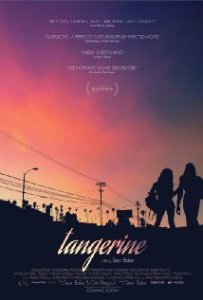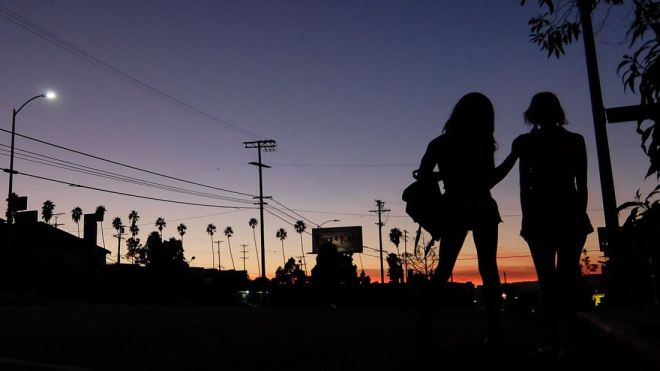 It’s Christmas Eve in a sun-drenched Hollywood. Sin-Dee Rella is a transgender prostitute back out on the block after a month in prison. Her first stop is Donut Time, a divey hangout that’s pure LA. Her best friend and fellow trans-prostitute Alexandra thinks they’re celebrating. Sin-Dee’s pimp boyfriend Chester has been cheating on her while in prison, and not with anyone, but with some “fish”, their clever way of saying that bitch has a vagina.
It’s Christmas Eve in a sun-drenched Hollywood. Sin-Dee Rella is a transgender prostitute back out on the block after a month in prison. Her first stop is Donut Time, a divey hangout that’s pure LA. Her best friend and fellow trans-prostitute Alexandra thinks they’re celebrating. Sin-Dee’s pimp boyfriend Chester has been cheating on her while in prison, and not with anyone, but with some “fish”, their clever way of saying that bitch has a vagina.
Except this is news to Sin-Dee, and shit’s about to go down. We’re off to the races now.
This is the set-up of “Tangerine”, a fast-moving, spitfire, gangsta and girl power indie that’s a pure riot. Sean Baker’s film cranks the volume on a soundtrack that’s thug-life hip hop and dubstep and burns through an indie buddy comedy that’s hilarious, outrageous, but also potentially groundbreaking in its portrayal of transgender actors and stars. “Tangerine” is the most queer movie of the year, but also the most fun.
That’s because Sin-Dee (Kitana Kiki Rodriguez) gives no fucks on her quest to find Chester and the girl he’s cheating with, and though Alexandra (Mya Taylor) says she doesn’t want any drama, you know that’s all we’re going to get. Sin-Dee marches out of Donut Time as gunshots ring out on the soundtrack and rave music follows her down the street. Baker turns her into Dirty Harry, marching down Sunset with a vengeance, throwing burns and an increasingly creative vocabulary at anyone who pretends they don’t know where to find Chester (James Ransone) or that fish, whatever her name is. Something with a “D”.
Of course Sin-Dee isn’t the only girl on the block. And Alexandra’s only other real friend is a married cab driver named Razmik (Karren Karagulian). He solicits a prostitute only to be disappointed to learn that she has a pussy. He regularly goes down on Alexandra while passing through a car wash, anything to get away from the drunks and losers who take up space in his cab.
“Tangerine” is really a film about community. When Sin-Dee finally finds Chester back at Donut Time, the whole film turns into a small-scale circus and shit-show. But what has emerged through this entire day is a group of people who know everyone’s names, who occupy the lesser-traveled areas of Tinsel Town, and who have a mutual code and respect for everyone on the block. Even the cops are in on the game, calling Alexandra by name and giving her a pass when a guy tries to stiff her of $40. In a weird way when everyone is yelling and getting themselves thrown out of Donut Time, these people end up feeling closer. Alexandra didn’t want drama, but that’s what she got, and we know these people a little better.

Baker feels so close to his characters because “Tangerine” has the character of a home movie. Baker shot the entire film on an iPhone, and it looks gorgeous. The camera creates a sun-soaked movie full of vibrancy, it moves quickly and smoothly with the same sense of purpose as Sin-Dee, and it captures wide shots that match Alexandra’s loneliness. The purple, fluorescent hues of “Tangerine’s” horizon would be a shot to die for even with the best camera available.
“Tangerine” quotes a line near its conclusion: “Los Angeles is a beautifully wrapped lie.” Baker has wrapped LA around his finger, and he’s made yet another beautifully definitive movie of life in the city. But with its honesty toward transgender individuals and to this community at large, “Tangerine” is no lie.
3 ½ stars